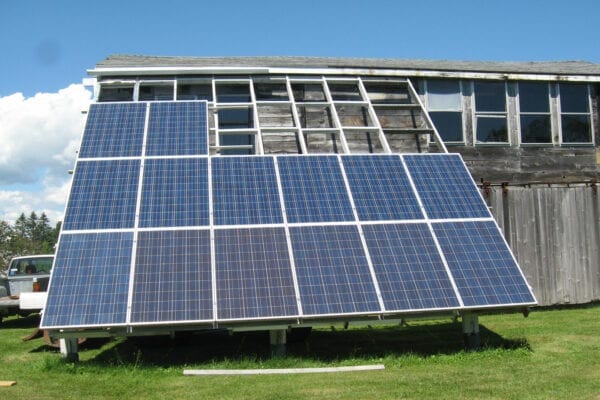Renewable Energy in Maine: Wind, Solar, Hydro, Biomass
Maine gets three-quarters of our electricity from dirty energy sources like coal, natural gas, and other fossil fuels, as well as nuclear.
Increasing energy efficiency and the amount of energy that we get from renewable sources like solar and wind is an essential part of the solution to reducing the amount of power we get from dirty energy.
Fortunately, Maine is well-situated to make the transition from dirty sources like coal to renewable energy sources like solar power and wind. These are the kinds of energy that future generations of Mainers can rely on.
Replacing Fossil Fuels with Clean Energy Sources like Solar and Wind

Solar panels on home in St. George, Maine
Clean, renewable energy sources bring us cleaner, healthier air and water. They also make Maine less dependent on imported energy and advance our economy. All sources of energy, including renewable ones, have trade-offs, but for decades we’ve been paying a very high price for our use of fossil fuels. Clean energy sources are a better deal, if developed thoughtfully. Our Maine-grown sources of energy include: solar power, wind power, hydropower, and biomass generation.
The vast majority of the electricity consumed in Maine—and the United States—comes from harmful, polluting sources: coal, oil, and gas. We have become deeply dependent on these fossil fuels in their many forms and uses. While there is no single solution that will eliminate harmful climate-changing pollution from these fuels, increasing the proportion of energy that we get from renewable resources is an essential part of the mix.
In contrast to fossil fuels, renewable energy can be harnessed sustainably over the long-term, and stabilizes our energy costs. Clean, renewable energy sources are helping Maine become more energy independent, improve air quality, and advance our economy—through new clean energy jobs and by reducing how much money we send out of state for fossil fuels.
Maine has used renewable energy sources including wood (biomass) and water (hydropower) for many generations. All energy sources, including renewable ones, have trade-offs. Ultimately they need to be compared to the alternative of continued use of fossil fuels.
- Wind and tidal power sources need to be careful sited or they can have unacceptable local impacts.
- Solar in Maine can generate electricity and/or heat water, and holds enormous potential, especially as the technology has advanced and prices have fallen dramatically.
- Burning wood in homes, industrial facilities or power plants, results in some air pollution, a lot if the burning is very inefficient. In addition, it is important to ensure that fuel wood is harvested sustainably, leaving healthy forests behind.
Generating electricity from clean renewable sources increases our opportunities to displace costly polluting oil and gasoline. Newer geothermal and other heat pumps can efficiently heat homes and businesses in Maine, using modest amounts of electricity. Electric and plug-in hybrid vehicles that would otherwise rely on petroleum can make use of clean electricity too. Overall, if done well, Maine can significantly increase the proportion of clean energy we use for power and for heating.
Electric Grid of the Future
In order to bring clean energy technologies to more homes and businesses across Maine, we’ll need to reimagine how we plan, build, and operate our electric grid.
An integrated grid planning law passed in 2022 sets us on a more positive path for designing the electric grid of the future by ensuring that each investment in the grid is driving us as quickly and equitably as possible toward a clean energy transition.
Learn more about grid planning and reform:









